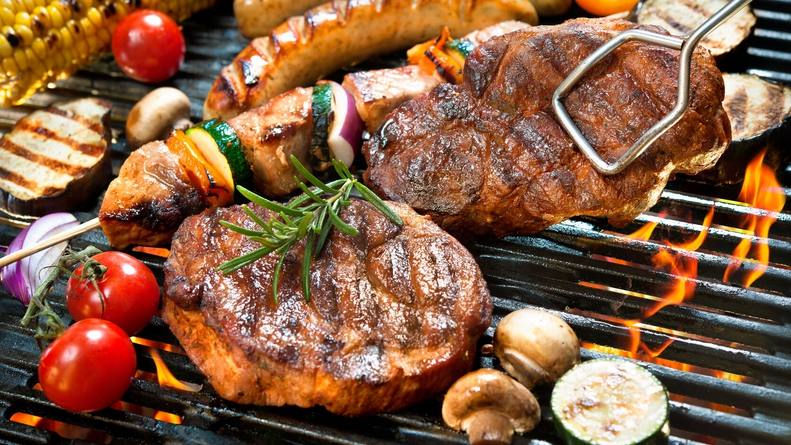
The July Fourth holiday weekend often means gatherings. Keep your gathering safe by following the Centers for Disease Control and Prevention's COVID-19 guidance for activities.
If you are looking forward to a weekend cookout, make sure to keep foodborne bacteria and germs off your guest list. Dr. Nipunie Rajapakse, a Mayo Clinic pediatric infectious diseases physician, says warmer temperatures are when foodborne germs thrive and illnesses peak.
Watch: Dr. Nipunie Rajapakse talks about safe grilling practices.
Journalists: Broadcast-quality sound bites are in the downloads at the end of the post. Please courtesy: "Mayo Clinic News Network."
Dr. Rajapakse offers a few important safety tips to keep your family and friends safe from foodborne illness when you’re around the grill:
Cooking meats destroys harmful germs.
Raw or undercooked meats can make you sick. When grilling meats, it’s important to ensure proper temperatures are reached before eating. Use a meat thermometer to check the temperatures.
Safe grilling temperatures for meat are:
- 145 F for steaks; roasts; and chops, such as lamb, pork and veal.
- 160 F for ground beef.
- 165 F for chicken and turkey.
Keep food separated.
Even if you keep your food separated, contaminated hands can easily spread bacteria from one food to another.
"Keep your raw meat and poultry products separate from your vegetable products such as salads that you may be serving without cooking or heating. That ensures that you’re not cross-contaminating your food with bacteria that may make people sick," Dr. Rajapakse says.
Practice good hand hygiene.
Wash your hands for at least 20 seconds with soap and water.
"Ensure that you are doing a really good job of washing your hands. This is especially important if you’re going between preparing meat and other foods. You need to ensure that you remove any traces of bacteria from your hands before you start preparing foods that you may not be cooking until later or won't be subjecting to a high temperature."
Properly store foods.
"The other important thing during grilling season is to ensure that you are storing or keeping food at a safe temperature," says Dr. Rajapakse. "We want to encourage people not to keep food in the danger zone, which is usually between 40 to 140 degrees Fahrenheit. That’s the ideal temperature for bacteria to reproduce and replicate. And when your food sits at that temperature for a prolonged period, you increase the risk that people might get sick from eating it."
Make sure leftovers get to the refrigerator. Food should sit out at room temperature for no longer than two hours. That time should be reduced to one hour if it is warmer than 90 F outside.
For the safety of its patients, staff and visitors, Mayo Clinic has strict masking policies in place. Anyone shown without a mask was recorded prior to COVID-19 or recorded in an area not designated for patient care, where social distancing and other safety protocols were followed.
Information in this post was accurate at the time of its posting. Due to the fluid nature of the COVID-19 pandemic, scientific understanding, along with guidelines and recommendations, may have changed since the original publication date.
For more information and all your COVID-19 coverage, go to the Mayo Clinic News Network and mayoclinic.org.
Learn more about tracking COVID-19 and COVID-19 trends.








